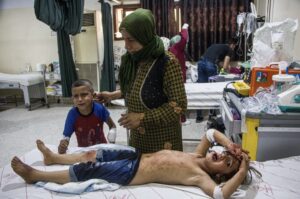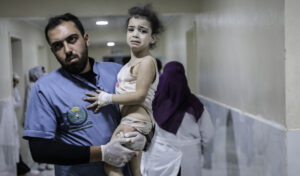In the bustling streets of Egypt, hidden behind stories of survival and hope, lie the untold tales of refugee women who have endured the most heinous crimes imaginable. In the shadows of society, these women not only grapple with the traumatic aftermath of sexual assault but also face the heart-wrenching predicament of unregistered children, born from the horrors they experienced. This investigation unveils the grim reality faced by these women and their children, shedding light on a deeply troubling issue that has remained largely overlooked.

The Plight of Alia and Kamal
Imagine a mother’s anguish when the sound of a police siren sends her child running in terror. Alia, a pseudonym for a Sudanese refugee in Egypt, knows this pain all too well. Fleeing Sudan in 2005 to protect her children from the ravages of war, little did she know that she would face a different kind of trauma in her host country. In 2009, Alia was kidnapped, held captive for a year and a half, and subjected to repeated sexual assaults. The result of these horrors was her son, Kamal, born in Egypt. However, due to her inability to prove Kamal’s lineage, he remains without any identification papers.
Alia’s daily life is marred by fear that her child will be taken from her. She restricts Kamal from venturing outside, knowing that without official documentation, he is vulnerable to being separated from her. The legal support that should be available to survivors like Alia, enabling them to prove incidents of rape and establish their children’s identities, has been shockingly inadequate.
A Startling Reality: Rape Among Refugee Women in Egypt
The United Nations High Commissioner for Refugees (UNHCR) in Cairo, in partnership with CARE International, released a report in 2020 titled “Egypt’s Response Plan to Support Refugees and Asylum Seekers from African Countries.” This report revealed alarming statistics regarding sexual violence against refugees in Egypt, with Africans constituting 90 percent of survivors. Rape emerged as the most common crime among reported sexual violence cases, with a significant majority of survivors being women and girls.
In October 2019, of the reported cases of sexual violence (142 in total), 85 were cases of rape, illustrating the grim prevalence of this crime. Shockingly, despite the gravity of these offenses, the investigation brings to light the negligence of both the UNHCR and the Egyptian Ministry of Interior in providing adequate legal support to survivors seeking justice.
Egypt’s Approach to Refugee Integration
Unlike some neighboring countries that confine refugees to camps, Egypt adopts a more open approach, allowing refugees to integrate into Egyptian society. However, this integration comes with challenges, particularly for refugee women living in precarious conditions, often in dangerous slum areas. These circumstances increase their vulnerability to rape and sexual assault.
Refugee women, struggling with their fragile situations and limited resources, frequently find themselves victims of gender-based violence, further exacerbated by the societal culture that often blames the victim rather than the perpetrator. The legal framework and law enforcement agencies have also failed to adequately address their rights and provide protection.
The Heartbreaking Saga of Unregistered Children
Perhaps the most heart-wrenching aspect of this investigation is the plight of children born from rape. Denied official recognition, these children are effectively invisible to the state. Their unregistered status prevents them from accessing basic healthcare and education, making them vulnerable to preventable diseases and perpetuating a cycle of disadvantage.
Kamal’s story serves as a poignant example. Despite being of school age, Kamal is deprived of his right to attend school, as his name is not officially registered on any documents. His mother, Alia, struggles to make ends meet, working for meager daily wages to support her family, including the costs of Kamal’s education. His presence at school remains “ghostly,” as he cannot participate in exams or school activities like his peers.
Legal and Societal Barriers
While the law in Egypt stipulates that every child has the right to acquire nationality, the reality for refugee women like Alia is far from this ideal. Proving the lineage of a child born from rape can be an insurmountable task, especially when the perpetrators are unknown or when survivors lack information about them.
Furthermore, the Egyptian police often lack the necessary gender-sensitive procedures to handle cases of sexual violence, and victims are frequently met with skepticism and blame. This, coupled with societal stigmatization, discourages survivors from reporting these crimes and seeking legal recourse.
The Way Forward
The stories of Alia, Maryam, and Etab, along with countless others, expose a deeply troubling and complex issue facing refugee women in Egypt. Urgent action is needed to address these challenges and provide comprehensive support to survivors of sexual violence, including legal assistance to establish the identities of their children.
Raising awareness about this issue is essential. Refugees have the right to live with dignity, free from violence and discrimination. It is crucial that the international community, including the UNHCR, Egypt’s government, and non-governmental organizations, collaborate to develop and implement effective solutions.
The international community must hold Egypt accountable for safeguarding the rights of refugees within its borders. By addressing the challenges faced by survivors of sexual violence and their children, we can work toward a more just and compassionate society, where all individuals, regardless of their background, are protected and valued.


